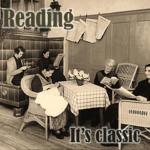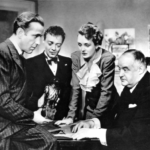
 Fictional teenager with secret powers: “I wish I could just be a normal teenager!”
Fictional teenager with secret powers: “I wish I could just be a normal teenager!”
Real-world normal teenager: “I wish I could have secret powers!”

 Fictional teenager with secret powers: “I wish I could just be a normal teenager!”
Fictional teenager with secret powers: “I wish I could just be a normal teenager!”
Real-world normal teenager: “I wish I could have secret powers!”
 There are people who want to be successful, and there are people who want to succeed.
There are people who want to be successful, and there are people who want to succeed.
Being successful means success in social terms, in terms of status, respect, credential, and self-esteem.
To succeed means success in practical terms, in terms of measurable progress, achievement, evidence, and self-improvement.
People who want to be successful say, “Let’s make this work!” Let’s build a business process out of enthusiasm and a can-do attitude! Let’s build a profitable third quarter out of persistence and cookie-cutter talking points about diversity, team effort, and leadership! Let’s build a ship out of cotton candy and unicorn dreams!
People who want to succeed are not afraid to say, “That isn’t going to work!” Collecting metrics on important but infrequent events will not provide a statistically valid sample size. Training people to improve innate talents they lack will never result in excellent performance. Obsessing about physical diversity while mismanaging intellectual diversity will achieve neither justice nor effectiveness.
People who want to succeed are not afraid to point out bad plans, no matter how frustrated it makes people who want to be successful, because the real world has real consequences and real causality. You can’t cheer yourself to success.

 Magician (waving wand): Watch me pull a rabbit out of my hat!
Magician (waving wand): Watch me pull a rabbit out of my hat!
Boy: Why?
Magician (slouching): What? Why what?
Boy: Why would you pull a rabbit out of a hat? Why would you want to?
Magician: It’s magic!
Boy: That’s kind of a dumb kind of magic.

 I have an accent. You have an accent. We all have accents. Nobody “doesn’t have an accent,” although you often hear people claim they don’t because they speak a particularly privileged accent.
I have an accent. You have an accent. We all have accents. Nobody “doesn’t have an accent,” although you often hear people claim they don’t because they speak a particularly privileged accent.
For some reason, I hear this asserted most often by people from America’s Pacific Northwest. Not sure what they’re teaching kids in school up in Ecotopia, but Oregonians and Washingtonians should know that they also speak a dialect and have an accent, just like all us Muggles.
True, in most languages there is often an accent or family of accents accepted as a “standard” for communication, but these are still accents. It’s a silly prejudice to think of one dialect as “just talking” and all the rest as accents, as silly as the prejudice that led many ancient cultures to name themselves The (Real/Genuine) People while everyone else were “the tribes.”
Just as silly as the prejudice that leads many today to honor a socially privileged style of literature as “literary” while all other styles are mere “genres.”
This sort of social signifier carries a lot of emotional weight. People are very touchy and defensive about their speaking styles, their writing styles, their cultural styles. Here’s a personal anecdote that shows how this can really make life unnecessarily difficult for everyone:

 The other day I made an argument for follow-up material to elevator pitches. My real point was about what makes stories actually work, and that it has nothing to do with a high-concept premise, an engaging summary, or a captivating elevator pitch.
The other day I made an argument for follow-up material to elevator pitches. My real point was about what makes stories actually work, and that it has nothing to do with a high-concept premise, an engaging summary, or a captivating elevator pitch.
But, as part of this, I was defending my practice of including follow-up material, including episode-by-episode or scene-by-scene outlines, with elevator pitches I feel really passionate about like Ocean City and Golem.
Recently, though, I’ve been working on a pitch for a period drama, and want to interweave the fictional character dynamics with real-world characters and events in a way that’s reminiscent of Black Sails and Downton Abbey. Noting how well the latter series has been building up to the historical crisis point of Nazi Germany, I want to do a full episodic outline of the first series with projected sketches for the subsequent four seasons leading to the well-known incident in American history.
An incident that shall remain nameless until I post the pitch. No spoilers! (As Doc Holliday said in Tombstone, my hypocrisy knows no bounds.)
The experience is giving me a real appreciation for the teamwork that goes into writing for a real television series, and the engrossing nature of doing this sort of work for a living. I have an editorial “day job” after all, and just trying to find the right threads to weave together has taken a surprising amount of time and research, even at the mere outline level of development.
New Girl creator Elizabeth Meriweather confessed on an episode of The Writers’ Room that she struggled with the need to leave a lot of the writing to others. I feel I’ve been pre-inocculated against that.

 Joke of the day:
Joke of the day:
A wormhole bar walks into a.

 “Why do you bother with the follow-up material in some of your elevator pitches? An elevator pitch is supposed to be succinct and easy to take in quickly.”
“Why do you bother with the follow-up material in some of your elevator pitches? An elevator pitch is supposed to be succinct and easy to take in quickly.”
Well, because elevator pitches alone are worthless, really. Elevator pitches, plot summaries, high-concept narratives, all of these conventional keys-through-the-gateways of publishing and Hollywood? They’re total bullshit measures of the worth (and success potential) of a story.
 A really brief elevator pitch for this morning.
A really brief elevator pitch for this morning.
In the early 1960s, the Hanna-Barbera animation studio produced a pair of wildly successful cartoon series that still resonate in American culture today. The Flintstones projected modern-day issues onto an imaginary prehistoric past, while The Jetsons did the same for the future.
In a post-Simpsons, post-South Park, post-Family Guy world, even your average animation consumer is far more sophisticated and cynical than viewers were in 1963. Moreover, to reboot the future-past anachronism concept, we’d need to update the tropes of the two shows to match modern tastes.
 It has been widely reported that actor Jack Gleeson, who plays King Joffrey on the HBO fantasy drama Game of Thrones, looks to Joaquin Phoenix’s portrayal of Emperor Commodus in the 2000 film Gladiator for a role model on how to portray a young sadistic autocrat.
It has been widely reported that actor Jack Gleeson, who plays King Joffrey on the HBO fantasy drama Game of Thrones, looks to Joaquin Phoenix’s portrayal of Emperor Commodus in the 2000 film Gladiator for a role model on how to portray a young sadistic autocrat.
Thinking about the two stories as a writer, and contemplating an observation I made earlier this year on how the character of Ned Stark still has such a strong hold on the Thrones mythos despite his early demise, I realized that there were more parallels between the stories. After all, Marcus Aurelius dies early on in the film, yet his presence (or absence) dominates the rest of the tale.
A lot of progress has been made in shifting professional language toward gender neutrality. We refer to firefighters rather than firemen, press for the acceptance of the singular they1 instead of the clumsy he/she, and employ metonymy to use chair in place of chairman.
One dirty little corner of our communication, however, clings to the often irrelevant nomenclature of gender. When discussing persons without professional titles like Reverend, Doctor, and Senator, we often substitute Mr. and Ms. which signify nothing but the presence of adult genitalia of one of the two standard-issue types.
It’s time to put an end to this, and NewGovOffice suggests two alternative rules of increasing professional rigor:
SOFT RULE: When referencing a person with no professional title, never use Mr. or Ms. with their full name. On first reference simply use the full name and, afterward, either their first name (if informal) or their last name preceded by Mr. or Ms. (if formal). For example:
- In an address block write “Roberta Xavier” and in salutation “Dear Ms. Xavier,” or “Dear Roberta,” but never “Ms. Roberta Xavier” under any circumstance.
- In an intro paragraph write “Samir Nouri heads our acquisitions team” and later “Mr. Nouri graduated from Virginia Tech…” or “Samir graduated from Virginia Tech…” but never “Mr. Samir Nouri” under any circumstance.
HARD RULE: When referencing a person with no professional title, simply never use Mr. or Ms. under any circumstance. Use their full name upon first reference and either their first or last name (depending on formality of occasion) on subsequent references. For example:
- “The new CEO is David Laurens … David comes to our company from the public sector…”
- “Brenda Hume founded the Hume Trust in 2005 … Hume has since created several charitable organizations in other countries…”
1 Contrary to the gripes of many half-informed grammar traditionalists, using they as a singular, gender-neutral pronoun dates back at least to Elizabethan times. It’s good English.